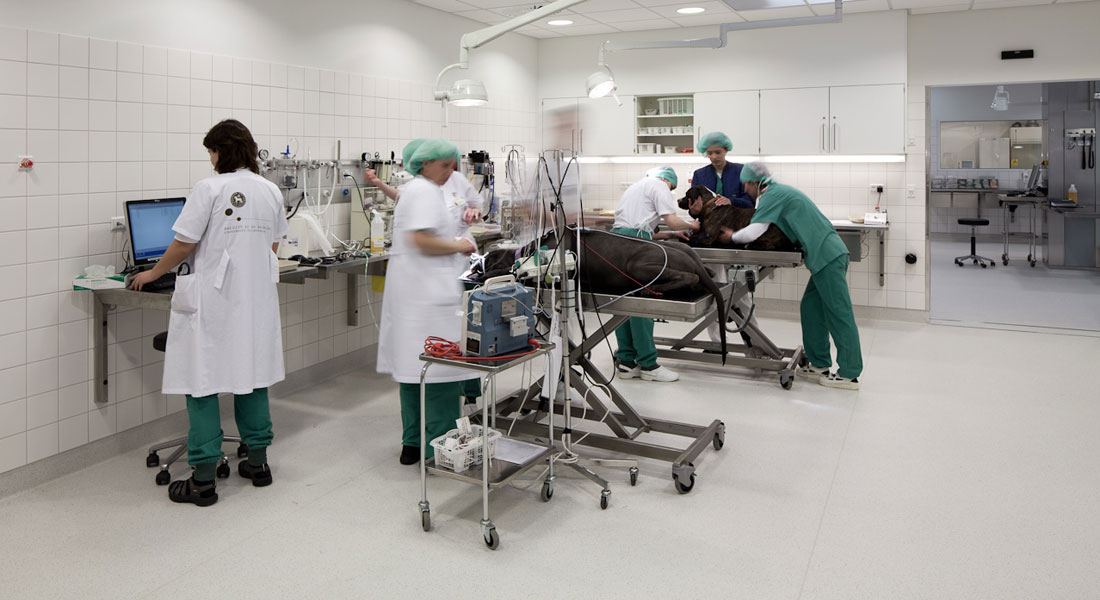Companion Animal Internal Medicine – Diagnosis and Treatment of Patients with Endocrine and Urological Diseases
This course is a specialisation course at the Master of Companion Animal Clinical Science. The Master is a post graduate education targeted small animal veterinarians seeking Continuing Professional Development (CPD).

The purpose of this course is:
- To provide the student with theoretical and practical skills to perform diagnostic work-up, establish prognosis and develop therapeutic strategies for the management of:
- dogs and cats with endocrine diseases.
- dogs and cats with upper and lower urinary tract diseases
- To provide the student with hands on knowledge in the field of advanced diagnostic imaging including abdominal ultrasonography.
- To demonstrate the use of advanced CT and MRI in internal medicine.
- By theory and practical exercises to extend the students knowledge, practical skills and competences within the clinical decision making and diagnostic procedures with regards to endocrine and urologic diseases.
Read more about the Master of Companion Animal Clinical Science.
A mixture of lectures, e-learning, theoretical and practical exercises. Case-study work.
Having completed the course, the student must be able to:
Knowledge
- Explain, reflect about and demonstrate overview of the systematic approach to the patient with symptoms of endocrine disease.
- Explain, reflect about and demonstrate overview of the systematic approach to the patient with symptoms of upper or lower urinary tract disease.
- Know aetiology, diagnosis, treatment and prognosis of endocrine diseases in dogs and cats at an advanced level.
- Know aetiology, diagnosis, treatment and prognosis of upper or lower urinary tract diseases in dogs and cats at an advanced level.
- To define, identify and evaluate veterinary methodology and the use of general and advanced veterinary imaging methods for internal medicine patients.
Skills
- Apply evidence based approaches to dogs and cats with complex endocrine or urologic symptoms.
- Perform oral presentation of patient history, symptoms and diagnostic plan for both specialist and non-specialist colleagues and client.
- Discuss relevant problems and questions within the systematic approach to patients with complex endocrine and urological symptoms.
- Use and adjust ultrasonographic equipment.
- Perform abdominal ultrasonographic examination at a basic level.
- Interpret, assess, and reflect on collected patient data in order to identify/localise the cause of endocrine or urologic disease occurrence, make clinical decisions, arrive at a diagnosis and apply and integrate evidence based scientific approaches to plan and administer further diagnostics, patient therapy and management.
Competences
- Collaborate and communicate within and between specialist and non-specialist peers and lay persons involved in companion animal patient management.
- Plan, evaluate and manage a diagnostic work-up and treatment of patients with complex endocrine or urologic diseases.
- Independently obtain, evaluate and elaborate on evidence based new knowledge at a specialty level within complex endocrine or urologic diseases.
You must meet the following criteria to be admitted to this course:
- Hold a degree in Veterinary Medicine.
- Hold one of the following certifications:
- DVA Certificate in Small Animal Diseases (equivalent to the 4 compulsory courses of the Master of Companion Animal Clinical Science).
- Swedish / Norwegian / Finnish specialist in diseases of dogs and cats.
- Equivalent competences.
- Have a minimum of 2 years of relevant work experience from companion animal practice.
- Be proficient in English.
Find detailed information about the formal requirements for this course.
The course responsibles of the advanced specialisation course in Companion Animal Internal Medicine are:
- Associate Professor Lisbeth Rem Jessen, Department of Veterinary Clinical Sciences, Section for Medicine, Oncology and Clinical Pathology, University of Copenhagen.
- Professor Charlotte Reinhard Bjørnvad, Department of Veterinary Clinical Sciences, Section for Medicine, Oncology and Clinical Pathology, University of Copenhagen.
Lecturers at the advanced specialisation course are:
- Doctor Jon Wray, Willows Veterinary Centre and Referral Service, Solihull, United Kingdom.
- Doctor Rory Bell, Swift Referrals, Wetherby, United Kingdom.
- Associate Professor Lisbeth Rem Jessen, Department of Veterinary Clinical Sciences, Section for Medicin, Oncology and Clinical Pathology, University of Copenhagen.
- Professor Charlotte Reinhard Bjørnvad, Department of Veterinary Clinical Sciences, Section for Medicine, Oncology and Clinical Pathology, University of Copenhagen
- Professor Fintan McEvoy, Department of Veterinary Clinical Sciences, Section for Veterinary Diagnostic Imaging, University of Copenhagen.
- Associate Professor Lene Buelund, Department of Veterinary Clinical Sciences, University of Copenhagen.
- Associate Professor Peter Panduro Damborg, Department of Veterinary Clinical Sciences, University of Copenhagen.
Course details
| Duration: | 5 days |
| Dates: | 13-17 November 2023 |
| Frequency: | Only available every second year |
| Course capacity: | 20 students |
| Place: | University Hospital for Companion Animals, Frederiksberg, Denmark |
| Course fee: | EU/EEA citizens Single course participant: 33,500 DKK Master student: 30,000 DKK Non-EU/EEA citizens Single course participant: 37,740 DKK Master student: 34,240 DKK Tuition fees include course materials and lunch/coffee. Books are not included in the tuition fees and must be purchased by the participants. |
| Level and credit: | Master course; 6 ECTS |
| Examination date: | Please consult the exam schedule |
| Application deadline: | 8 weeks before course commencement. |
| Admission: | To be admitted, you must meet the admission criteria for specialisations at Master of Companion Animal Clinical Science |
The opening of the application period is announced via the programme newsletter.
Download course curriculum
